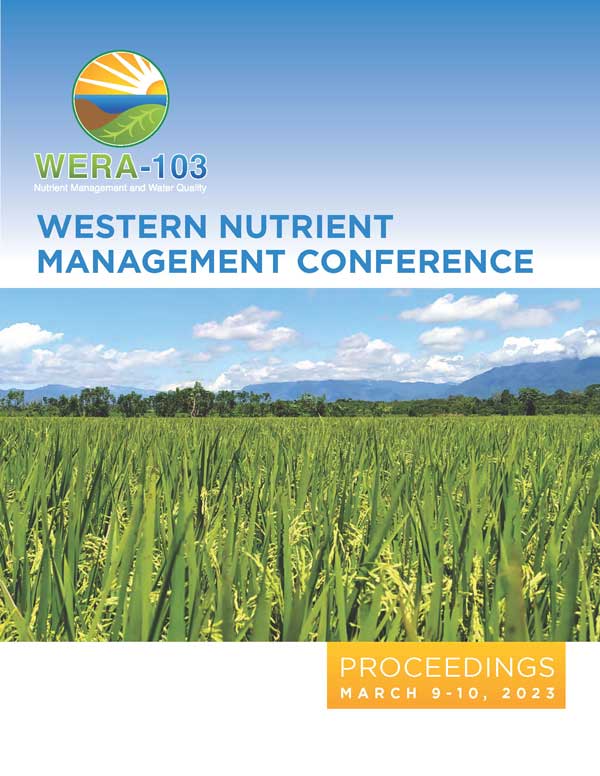Download the Conference Proceedings
Proceedings
Authors
| Filter results10 paper(s) found. |
|---|
1. Soil Testing to Improve Phosphorus Management on Intensive Vegetable Farms in HawaiiAccording to a recent survey of soil samples sent to the Agricultural Diagnostic Service Center (ADSC) at the University of Hawaii between October 2002 and September 2003, a majority of the samples showed soil test P (STP) levels in the high or excessive categories. Despite high soil test P, many farmers in Hawaii continue to apply P fertilizers. We began a project to evaluate soil P status on a range of vegetable farms throughout the state, to determine crop response to P fertilizers on soils... J. Deenik, S. Fukuda, R. Hamasaki, R. Shimabuku, R. Uchida |
2. Evaluating Potential Impacts of Land-applied Food Processing By-products on Soil Quality and Plant NutrientsFood processing canneries, especially those using raw fruit, nut, and vegetable- base materials, generate various types of by-products or non-hazardous wastes. The constituents of these wastes are dependent on the source of raw material and the substances associated with the canning processes. The use of land-applied non-hazardous wastes as an agricultural soil amendment is projected to rise because of public concerns regarding environmental impact and economic restraints of their disposal to... S. Pasakdee, N. Dellavalle |
3. Biochar Volatile Matter Content Effects on Plant Growth and Nitrogen Transformations in a Tropical SoilBiochars made from modern pyrolysis methods have attracted widespread attention as potential soil amendments with agronomic value. A series of greenhouse experiments and laboratory incubations were conducted to assess the effects of biochar volatile matter (VM) content on plant growth, nitrogen (N) transformations, and microbial activities in an acid tropical soil. High VM biochar inhibited plant growth and reduced N uptake with and without the addition of fertilizers. Low VM charcoal supplemented... J. Deenik, A. Mcclellan, G. Uehara |
4. The Use of Biochar As a Fertility Amendment in Tropical SoilsBiochars made from modern pyrolysis methods have attracted widespread attention as potential soil amendments to improve plant productivity in the infertile soils of the tropics. Feedstock and pyrolysis conditions affect the physico-chemical properties of biochar with important implications for soil fertility and plant growth. Specifically, biochar volatile matter (VM) significantly affect soil inorganic nitrogen (N) status and ash content impacts soil elemental composition and pH. This paper highlights... J. Deenik, T. Mcclellan |
5. Utilizing Food Processing By-products As a Soil Amendment: Soil Nutrient AvailabilityWe studied the impact of food processing by-products which contain high moisture content, low pH, high total dissolved salts, and trace elements. The primary goal of this project was to develop best management practices for sustainable reuse of food processing by-products as a soil amendment on California farmlands. Quantifying soil nutrient availability from these by-products is critical to growers to carefully establish fertilizer replacement value to improve their crop nutrient use efficiency... S. Pasakdee, N. Dellavalle |
6. Nitrogen Transformations in Flooded Agroecosystems: a Case Study with Taro (Colocassia Esculenta)Wetland agriculture covers an estimated 170 million ha and contributes significantly to global food supply. Nitrogen fertilizers are subject to numerous potential transformation pathways in flooded systems. The present research was focused on improving our understanding of N transformations in a flooded agricultural system by addressing the following two broad objectives: 1) determine whether the presence of anammox bacteria and its activity contribute significantly to N losses, and 2) evaluate... J. Deenik, C. Penton, B. Popp, G. Bruland, P. Engstrom, J. Mueller, J. Tiedje |
7. Nutrient Management in a Regulated EnvironmentLaws and regulations mandate nutrient management that good managers have long practiced or should have. Prior to governmental regulations, economics was a major regulator. However, high returns on nitrogen inputs led to over application, causing environmental issues and human health concerns, which led to legal regulation. The Federal Clean Water Act (CWA) and the California Porter-Cologne Act provide for regulation of pollution of surface waters, groundwaters, and wetlands. The statewide Water... N. Dellavalle |
8. Canola Roots of Water and Nitrogen Use Efficiency: New Lessons for PNW Wheat GrowersThe semi-arid inland Pacific Northwest (iPNW) has primarily produced wheat for 125 years due to favorable climate, soils, economics and policy drivers. Shifting drivers over the past decade related to energy, climate change, regional and global markets have created new opportunities for the integration of canola into iPNW wheat-dominated rotations. Traditional wheat grower mindsets required an agronomic reboot, forged by an understanding of canola vs. wheat physio morphology, an explosion of variety... W. Pan, T. Maaz, I. Madsen, W. Hammac, M. Reese |
9. Preliminary Assessment of the Solvita-CO2 Test in Characterizing Management Effects on Soil Biological Activity in Some Soils of HawaiiThe health of agricultural soils depends to a great degree on management practices that promote soil organic matter accumulation. While total soil organic carbon (C) is the standard measure of soil organic matter, it changes slowly and does not provide a sensitive enough test to assess short term management effects on soil health. However, a key indicator of healthy soil is potential biological activity, which can be measured rapidly with soil testing via short-term carbon (C) mineralization following... J. Deenik, M. Loo |
10. Soil Diversity and Agricultural Adaptation Across MicronesiaMicronesia, a sub-region of Oceania, comprises approximately 2,100 small islands belonging to five sovereign nations scattered across 2.9 million square miles of the Western Pacific. A majority of the islands are low-lying, sandy coralatolls, but high volcanic islands and raised limestone islands are major population centers in the region. Palau, in the west, was first settled by seafaring peoples as early as 4000-4500 BP and the colonization of Marshall Islands at the eastern edge... J. Deenik |
